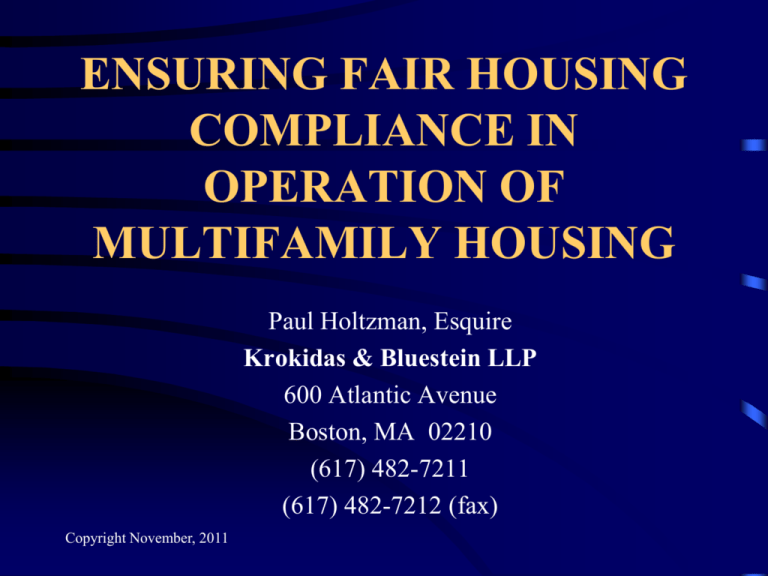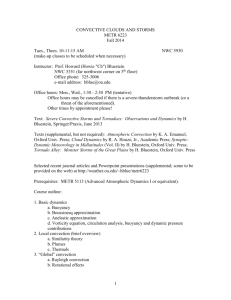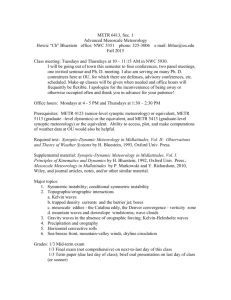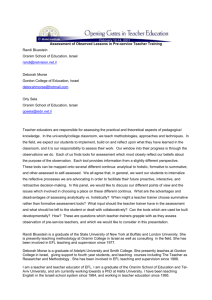Fair Housing (Power Point Slides)
advertisement

ENSURING FAIR HOUSING COMPLIANCE IN OPERATION OF MULTIFAMILY HOUSING Paul Holtzman, Esquire Krokidas & Bluestein LLP 600 Atlantic Avenue Boston, MA 02210 (617) 482-7211 (617) 482-7212 (fax) Copyright November, 2011 HALLKEEN MANAGEMENT Manager Training November, 2011 TOPICS • • • • Legal Obligations Refusal to Rent Discrimination in Terms, Conditions, or Privileges Discriminatory Inquiries About Protected Class Membership • Handicap Accessibility and Nondiscrimination Copyright November, 2011 KROKIDAS & BLUESTEIN • • • • • • • Defining Terms Protected Classes Disability or Handicap Equal Access Fair and Equal Treatment Reasonable Accommodation Undue Hardship Copyright November, 2011 KROKIDAS & BLUESTEIN • Enforcing Policies and Rules of Conduct in Nondiscriminatory Manner • Responding to Reasonable Accommodation Requests • Responding to Maintenance Requests • Families with Children • Advertisements and Notices • Identifying Illegal Discrimination • Non-Discrimination Policy and Complaint Procedure • Personal, Individual Liability • Other Kinds of Unlawful Discrimination • Sexual Harassment • Harassment on the basis of race, sexual orientation, gender, nationality/origin, etc. Copyright November, 2011 KROKIDAS & BLUESTEIN MASSACHUSETTS LAW FAIR HOUSING • CHAPTER 151B. PROHIBITS DISCRIMINATION IN HOUSING AND RELATED TRANSACTIONS ON THE BASIS OF RACE, COLOR, RELIGION, SEX, FAMILIAL STATUS, HANDICAP AND NATIONAL ORIGIN Copyright November, 2011 KROKIDAS & BLUESTEIN CHAPTER 151B: SECTION 4 UNLAWFUL PRACTICES Section 4. It shall be an unlawful practice: 6. For the owner, lessee, sublessee, licensed real estate broker, assignee or managing agent of publicly assisted or multiple dwelling or contiguously located housing accommodations...or any agent or employee of such a person [to]... Copyright November, 2011 KROKIDAS & BLUESTEIN REFUSAL TO RENT To refuse to rent or lease or sell or negotiate for sale or otherwise to deny to or withhold from any person or group of persons such accommodations because of the race, religious creed, color, national origin, sex, sexual orientation, which shall not include persons whose sexual orientation involves minor children as the sex object, age, genetic information, ancestry, or marital status of such person or persons or because such person is a veteran or member of the armed forces, or because such person is blind, or hearing impaired or has any other handicap. Copyright November, 2011 KROKIDAS & BLUESTEIN DISCRIMINATION IN TERMS, CONDITIONS, OR PRIVILEGES To discriminate against any person because of his race, religious creed, color, national origin, sex, sexual orientation, which shall not include persons whose sexual orientation involves minor children as the sex object, age, ancestry, or marital status or because such person is a veteran or member of the armed forces,, or because such person is blind, or hearing impaired or has any other handicap in the terms, conditions or privileges of such accommodations or the acquisitions thereof, or in the furnishings of facilities and services in connection therewith, or because such a person possesses a trained dog guide as a consequence of blindness, or hearing impairment. Copyright November, 2011 KROKIDAS & BLUESTEIN DISCRIMINATORY INQUIRIES ABOUT PROTECTED CLASS MEMBERSHIP To cause to be made any written or oral inquiry or record concerning the race, religious creed, color, national origin, sex, sexual orientation, which shall not include persons whose sexual orientation involves minor children as the sex object, age, genetic information, ancestry or marital status of the person seeking to rent or lease or buy any such accommodation, or concerning the fact that such person is a veteran or a member of the armed forces or because such person is blind or hearing impaired or has any other handicap. Copyright November, 2011 KROKIDAS & BLUESTEIN REASONABLE ACCOMMODATIONS • For purposes of subsections 6 and 7 discrimination on the basis of handicap shall include but not be limited to: • (1) a refusal to permit or to make, at the expense of the handicapped person, reasonable modification of existing premises occupied or to be occupied by such person if such modification is necessary to afford such person full enjoyment of such premises; provided, however, that, in the case of publicly assisted housing, multiple dwelling housing consisting of ten or more units, or contiguously located housing consisting of ten or more units, reasonable modification shall be at the expense of the owner or other person having the right of ownership; Copyright November, 2011 KROKIDAS & BLUESTEIN • provided, further, that, in the case of public ownership of such housing units the cost of such reasonable modification shall be subject to appropriation; and provided, further, that, in the case of a rental, the landlord may, where the modification to be paid for by the handicapped person will materially alter the marketability of the housing, condition permission for a modification on the tenant agreeing to restore or pay for the cost of restoring, the interior of the premises to the condition that existed prior to such modification, reasonable wear and tear excepted; Copyright November, 2011 KROKIDAS & BLUESTEIN • (2) a refusal to make reasonable accommodations in rules, policies, practices, or services, when such accommodations may be necessary to afford a handicapped person equal opportunity to use and enjoy a dwelling; and • (3) discrimination against or a refusal to rent to a person because of such person's need for reasonable modification or accommodation. Copyright November, 2011 KROKIDAS & BLUESTEIN • Reasonable modification shall include, but not be limited to, making the housing accessible to mobilityimpaired, hearing-impaired and sight-impaired persons including installing raised numbers which may be read by a sight-impaired person, installing a door bell which flashes a light for a hearing-impaired person, lowering a cabinet, ramping a front entrance of five or fewer vertical steps, widening a doorway, and installing a grab bar; provided, however, that for purposes of this subsection, the owner or other person having the right of ownership shall not be required to pay for ramping a front entrance of more than five steps or for installing a wheelchair lift. Copyright November, 2011 KROKIDAS & BLUESTEIN UNDUE HARDSHIP • Notwithstanding any other provisions of this subsection, an accommodation or modification which is paid for by the owner or other person having the right of ownership is not considered to be reasonable if it would impose an undue hardship upon the owner or other person having the right of ownership and shall therefore not be required. Factors to be considered shall include, but not be limited to, the nature and cost of the accommodation or modification needed, the extent to which the accommodation or modification would materially alter the marketability of the housing, the overall size of the housing business of the owner or other person having the right of ownership, including but not limited to, the Copyright November, 2011 KROKIDAS & BLUESTEIN • number and type of housing units, size of budget and available assets, and the ability of the owner or other person having the right of ownership to recover the cost of the accommodation or modification through a federal tax deduction. Ten percent shall be the maximum number of units for which an owner or other person having the right of ownership shall be required to pay for a modification in order to make units fully accessible to persons using a wheelchair pursuant to the requirements of this subsection. Copyright November, 2011 KROKIDAS & BLUESTEIN DISCRIMINATORY ADVERTISEMENTS OR STATEMENTS • For any person to make print, or publish, or cause to be made, printed, or published any notice, statement or advertisement, with respect to the sale or rental of multiple dwelling, contiguously located, publicly assisted or other covered housing accommodations that indicates any preference, limitation, or discrimination based on race, color, religion, sex, sexual orientation which shall not include persons whose sexual orientation involves minor children as the sex object, national origin, genetic information, ancestry, children, marital status, public assistance recipiency, or handicap or an intention to make any such preference, limitation or discrimination except where otherwise legally permitted. Copyright November, 2011 KROKIDAS & BLUESTEIN For What Acts May A Discrimination Complaint Be Filed: Refusing to rent, sell, or deal with a person, or otherwise denying a unit or making it unavailable on notice; Falsely representing that a unit is not available; Discriminating in the terms, conditions or privileges of sale, rental, occupancy, or in services or facilities in connection with a dwelling; Advertising or otherwise stating a preference or limitation related to a protected class Copyright November, 2011 KROKIDAS & BLUESTEIN Attempting to intimidate, coerce or deter a person from filing a complaint or lawsuit alleging discrimination, or retaliating against a person for doing so; Threatening, intimidating, or interfering with a person’s enjoyment of a dwelling because the resident is a member of a protected class; Retaliating against a tenant or prospective tenant for having asserted rights to be free from housing discrimination; and Retaliating against a tenant or prospective tenant for having assisted another person to assert right to be free from housing discrimination. Copyright November, 2011 KROKIDAS & BLUESTEIN Practical Tips To Ensure Compliance With The Law • • • • Treat everyone alike. Provide consistent and complete information to everyone. Make decisions based only on objective criteria. Do not make credit assumptions based on non-credit factors. • Know the law. • Be familiar with and act consistently with the HallKeen Non-Discrimination Policy. Copyright November, 2011 KROKIDAS & BLUESTEIN The Fair Housing Act • The Fair Housing Act prohibits discrimination in housing because of: • Race or color • National origin • Religion • Sex • Familial status (including children under the age of 18 living with parents or legal custodians; pregnant women and people securing custody of children under 18) • Handicap (Disability) Copyright November, 2011 KROKIDAS & BLUESTEIN What is Prohibited? • In the Sale and Rental of Housing: No one may take any of the following actions based on race, color, national origin, religion, sex, familial status or handicap (disability): – Refuse to rent or sell housing – Refuse to negotiate for housing – Make housing unavailable – Deny a dwelling – Set different terms, conditions or privileges for sale or rental of a dwelling Copyright November, 2011 KROKIDAS & BLUESTEIN – Provide different housing services or facilities – Falsely deny that housing is available for inspection, sale or rental – For profit, persuade owners to sell or rent (blockbusting) or – Deny anyone access to or membership in a facility or service (such as a multiple listing service) related to the sale or rental of housing. Copyright November, 2011 KROKIDAS & BLUESTEIN • It is illegal for anyone to: • Threaten, coerce, intimidate or interfere with anyone exercising a fair housing right or assisting others who exercise that right • Advertise or make any statement that indicates a limitation or preference based on race, color, national origin, religion, sex, familial status or handicap (disability). This prohibition against discriminatory advertising applies to single-family and owneroccupied housing that is otherwise exempt from the Fair Housing Act. Copyright November, 2011 KROKIDAS & BLUESTEIN Disability Discrimination • The law protects an applicant or tenant or someone associated with who: – Has a physical or mental disability (including hearing, mobility and visual impairments, cancer, chronic mental illness, AIDS, AIDS Related Complex and mental retardation) that substantially limits one or more major life activities – Has a record of such a disability or – Is regarded as having such a disability Copyright November, 2011 KROKIDAS & BLUESTEIN However, housing need not be made available to a person who is a direct threat to the health or safety of others or who currently abuses illegal drugs or alcohol. Copyright November, 2011 KROKIDAS & BLUESTEIN How Can Fair Housing Act Issues Affect Me Personally? • If you participated in an act of unlawful discrimination, even at the direction of someone else, you can face personal liability. This could mean that you have to pay real money as damages if a plaintiff is successful. Copyright November, 2011 KROKIDAS & BLUESTEIN What is the most common form of discrimination based on race or color? • Intentionally grouping individuals by race or national origin in a particular buildings or part of a building constitutes illegal segregation. Copyright November, 2011 KROKIDAS & BLUESTEIN What is “Steering?” • “Steering” is when you try to discourage someone from applying for tenancy at a development by suggesting that they “might be happier” or “more comfortable” somewhere else. Any statement or conduct that conveys to an individual that his/her application is less than welcome can be unlawful. Copyright November, 2011 KROKIDAS & BLUESTEIN What are other examples of discrimination on the basis of race or color? • Establishing separate screening criteria based on race (e.g. criminal background checks) • Taking action for lease violations against non-white residents (e.g., non-payment of rent or interference with right to quiet enjoyment), but being more lenient with white residents who commit similar violations • Prioritizing maintenance work orders based on the person, rather than the job, and giving first preference to residents of one race over another • Providing a lesser standard of maintenance service for one race Copyright November, 2011 KROKIDAS & BLUESTEIN ADVERTISING How can an advertisement constitute discrimination? How about an ad portraying only white residents? • Any advertisement which gives the impression that the housing is for members of a certain race can be regarded as discriminatory. While you may not intend discrimination, such an ad can be construed as discriminatory. Essentially, all advertising campaigns using human models should depict the majority and minority population in your metropolitan area (this is not the neighborhood or area of town, but the entire area) and children as well. Copyright November, 2011 KROKIDAS & BLUESTEIN • Human models should be depicted in similar size and social standing (not residents who are white and service personnel who are not). If you envision an ad with a single resident portrayed, rotate the various groups (racial, ethnic, etc.) during the course of the advertisement publication. And have your rotation plan in writing before you start. Copyright November, 2011 KROKIDAS & BLUESTEIN What about the Equal Housing Opportunity Logo? • While the regulations do not require the use of the logo, they strongly recommend it. Using it not only in ads, but on business cards, letterhead, bulletin board notices and brochures is wise. Copyright November, 2011 KROKIDAS & BLUESTEIN What about discrimination on the basis of gender? • First, the gender of children and their parents or guardians is a non-issue for you. That means that brothers and sisters of any age can share bedrooms, as can fathers and daughters, mothers and sons. So don’t suggest, for example, that a single mom with a teenage son and teenage daughter would be happier in a 3 bedroom than in the 2 bedroom apartment she has asked about. Copyright November, 2011 KROKIDAS & BLUESTEIN What is the definition of sexual harassment? • The federal statute defines sexual harassment as “repeated, pervasive, offensive conduct or behavior of a sexual nature.” Copyright November, 2011 KROKIDAS & BLUESTEIN So how is sexual harassment prohibited in the Fair Housing Act? There are two types of sexual harassment prohibited by the Act: 1. Quid Pro Quo. This is a Latin term which, loosely translated means “this for that.” It is the most overt form of sexual harassment. 2. Hostile Housing Environment. This is more subtle and is similar to “hostile work environment” in the employment setting. Copyright November, 2011 KROKIDAS & BLUESTEIN • Examples • Management agent to a prospective resident: “Honey, if you go out with me, you’re going to get a nice discount on your rent.” • In this example, based on an actual case, the individual alleged to have sexually harassed is offering something (a break in the rent) in exchange for sexual favors. Copyright November, 2011 KROKIDAS & BLUESTEIN • A resident goes to her apartment. She passes a couple of maintenance employees for the property who leer and whistle at her. She complains to management, which takes no action except to assure her not to worry. Copyright November, 2011 KROKIDAS & BLUESTEIN How was management wrong to respond in that way? • In the second example, the resident felt threatened and unsafe. The maintenance employees may have had pass keys (they did). She also felt dehumanized and objectified. Management did not seem to take the matter seriously, and she felt further humiliated by their response. Copyright November, 2011 KROKIDAS & BLUESTEIN Does the Fair Housing Act prohibit discrimination on the basis of religion? • The same way it prohibits other types of discrimination. You cannot have different conditions in the sale, rental or conditions of occupancy based on someone’s religious belief (or non-belief). Copyright November, 2011 KROKIDAS & BLUESTEIN Can we allow residents to hold a religious service in the community room? • Yes, that is okay. But you must be aware that if you allow the use of a community room for one religion’s observance, you must also allow it for others’. Copyright November, 2011 KROKIDAS & BLUESTEIN What is national origin discrimination? • Treating an individual differently in the terms of rental, conditions of occupancy or other areas of policy, practice or procedure based on their country of origin, presumably outside of the United States. Copyright November, 2011 KROKIDAS & BLUESTEIN Does the Fair Housing Act provide a definition of who is disabled? • Yes. An individual is considered to be disabled if: (1) They have a physical or mental impairment that substantially limits one or more major life activities; or (2) They have a record of such impairment; or (3) They have a record of such impairment. The definition is identical to the definition in Section 504 and the Americans with Disabilities Act. Copyright November, 2011 KROKIDAS & BLUESTEIN • So, under this definition, many people can be protected as disabled even if they would not be eligible for Social Security Disability payments? • That’s correct. • Is there anyone who would not be considered disabled under the Fair Housing Act? • Yes. Individuals who currently abuse alcohol or narcotics are not considered to be disabled. Copyright November, 2011 KROKIDAS & BLUESTEIN What is the definition of “reasonable accommodation?” The definition of reasonable accommodation is the following: An alteration to a policy, practice or procedure that is both reasonable and necessary to enable a person with a disability to benefit from and enjoy housing. The regulations state the following: It shall be unlawful for any person to refuse to make reasonable accommodations in rules, policies, practices, or services, when such accommodations may be necessary to afford a handicapped person equal opportunity to use and enjoy a dwelling unit, including public and common use areas. Copyright November, 2011 KROKIDAS & BLUESTEIN What is “reasonable?” A request for an accommodation would be unreasonable if: (1) it would create an undue financial and administrative burden; or (2) a fundamental alteration of the program or operation.. Copyright November, 2011 KROKIDAS & BLUESTEIN What’s an Undue Financial Burden It means that the cost of the requested accommodation would not result in financial impairment to the property or a loss of services to other residents; or that the staff time involved in making the accommodation would not result in a loss of services to other residents. HUD advises that federally assisted properties must look at their operating accounts and their replacement reserve accounts, as well as residual receipts. Copyright November, 2011 KROKIDAS & BLUESTEIN What is a fundamental alteration of program? A fundamental alteration of program occurs when the resident requests a service that is not routinely available or provided by the property. For example, an individual who cannot cook for himself due to a disability asks the property to provide him with meal service. If the property has no meals program for residents, the request would be a fundamental alteration of program Copyright November, 2011 KROKIDAS & BLUESTEIN So if we determine a request isn’t reasonable, we can deny it? The answer is yes, and no. Your view of what is not reasonable is subject to review by a Court. Plus, even if you are justified in denying a request, you would still be required to work with the individual requesting the accommodation to find an equally effective accommodation. For example, helping the resident to arrange for “Meals on Wheels.” Copyright November, 2011 KROKIDAS & BLUESTEIN HallKeen Process for Reasonable Accommodation Requests A formal request for accommodation requires that (1) The resident sign a verification authorization to be sent to a physician or other qualified individual in order to verify (a) The individual meets the definition of disabled in the Fair Housing Act; (b) There is a need for the requested accommodation because of the disability. Copyright November, 2011 KROKIDAS & BLUESTEIN What is a reasonable modification? Unlike a reasonable accommodation which usually means a change in policies, practices and procedures, a reasonable modification covers changes in physical structure. Copyright November, 2011 KROKIDAS & BLUESTEIN HUD regulations state: It shall be unlawful for any person to refuse to permit, at the expense of a handicapped person, reasonable modifications of existing premises, occupied or to be occupied by a handicapped person, if the proposed modifications may be necessary to afford the handicapped person full enjoyment of the premises of a dwelling. Copyright November, 2011 KROKIDAS & BLUESTEIN In the case of a rental, the landlord may, where it is reasonable to do so, condition a modification to the condition that existed before the modification, reasonable wear and tear excepted. The landlord may not increase for handicapped persons any customarily required security deposit. However, where it is necessary in order to ensure with reasonable certainty that funds will be available to pay for the restorations at the end of the tenancy, the landlord may negotiate as part of such a restoration agreement a provision requiring that the tenant pay into an interest bearing escrow account, over a reasonable period, a reasonable amount of money not to exceed the cost of the restorations. The interest in any such account shall accrue to the benefit of the tenant. Copyright November, 2011 KROKIDAS & BLUESTEIN A landlord may condition permission for a modification on the renter providing a reasonable description of the proposed modifications as well as reasonable assurances that the work will be done in a workmanlike manner and that any required building permits will be obtained. . Copyright November, 2011 KROKIDAS & BLUESTEIN EXAMPLES FROM REGULATIONS A tenant with a handicap asks his or her landlord for permission to install grab bars in the bathroom at his or her own expense. It is necessary to reinforce the walls with blocking between studs in order to affix the grab bars. It is unlawful for the landlord to refuse to permit the tenant, at the tenant’s own expense, from making the modifications necessary to add the grab bars. Copyright November, 2011 KROKIDAS & BLUESTEIN However, the landlord may condition permission for the modification on the tenant agreeing to restore the bathroom to the condition that existed before the modification, reasonable wear and tear excepted. It would be reasonable for the landlord to require the tenant to remove the grab bars at the end of the tenancy. The landlord may also reasonably require that the wall to which the grab bars are to be attached be repaired and restored to its original condition, reasonable wear and tear excepted. However, it would be unreasonable for the landlord to require the tenant to remove the blocking, since the reinforced walls will not interfere in any way with the landlord’s or the next tenant’s use and enjoyment of the premises and may be needed by some future tenant. Copyright November, 2011 KROKIDAS & BLUESTEIN Example (2): An applicant for rental housing has a child who uses a wheelchair. The bathroom door in the dwelling unit is too narrow to permit the wheelchair to pass. The applicant asks the landlord for permission to widen the doorway at the applicant’s own expense. It is unlawful for the landlord to refuse to permit the applicant to make the modification. Further, the landlord may not, in usual circumstances, condition permission for the modification on the applicant paying for the doorway to be narrowed at the end of the lease because a wider doorway will not interfere with the landlord’s or the next tenant’s use and enjoyment of the premises. Copyright November, 2011 KROKIDAS & BLUESTEIN What are some limitations to the requirement to make reasonable modifications? You do not have to install an elevator in a building that doesn’t have an elevator. Likewise, you do not have to make or allow any modifications that would involve removing or altering a load bearing structural support. You do not have to make or allow any modifications that would involve a replacement cost of 50% or more of the element of the building being modified. Copyright November, 2011 KROKIDAS & BLUESTEIN What is familial status discrimination? Familial status discrimination protects families with children in matters pertaining to housing. A child is defined as someone younger than age 18 – whether or not a blood relative of the primary tenants. Copyright November, 2011 KROKIDAS & BLUESTEIN Examples of familial status discrimination Requiring a family with children to occupy an apartment on a lower floor. This would be considered a policy that restricts housing choice. Requiring a single mother with a child to occupy (or be eligible for) a two bedroom unit. A parent or grandparent can share a bedroom with a child at their option, no matter whether the child is a boy or a girl. Copyright November, 2011 KROKIDAS & BLUESTEIN Having rules that target children, such as a policy that states children shall not play in the hallways. In fact, any policy that mentions the words “child” or “children” needs to be reviewed for compliance with the Fair Housing Act. There was a case challenging such a policy where the property was found liable for familial status discrimination. The judge noted that children playing checkers in the hallway would not disturb anyone, and that if the company’s intent was to have zero tolerance for noise or disruptions in the hallways, that policy should be addressed to all residents and not just to those with children. Copyright November, 2011 KROKIDAS & BLUESTEIN There are, of course, valid ways to have rules related to children for swimming pools, exercise facilities and other equipment. Copyright November, 2011 KROKIDAS & BLUESTEIN RECAP - Takeaway Points - Practical Tips QUESTIONS FROM PARTICIPANTS Copyright November, 2011







